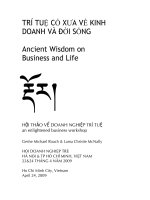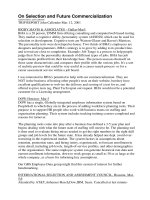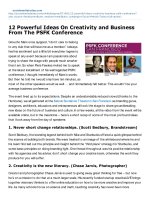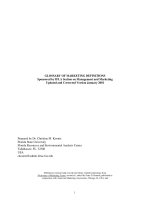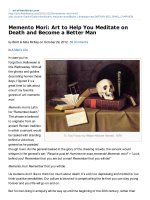Presenting on TV and radio~an insiders guide 2003
Bạn đang xem bản rút gọn của tài liệu. Xem và tải ngay bản đầy đủ của tài liệu tại đây (3.6 MB, 272 trang )
Trewin-FM.qxd
7/26/03
7:24 PM
Page i
Presenting on TV and Radio
Trewin-FM.qxd
7/26/03
7:24 PM
Page ii
Trewin-FM.qxd
7/26/03
7:25 PM
Page iii
Presenting on TV and Radio
An insider’s guide
Janet Trewin
Trewin-FM.qxd
7/26/03
7:25 PM
Page iv
Focal Press
An imprint of Elsevier
Linacre House, Jordan Hill, Oxford OX2 8DP
200 Wheeler Road, Burlington, MA 01803
First published 2003
Copyright © 2003, Janet Trewin. All rights reserved
The right of Janet Trewin to be identified as the author of this work has been
asserted in accordance with the Copyright, Designs and Patents Act 1988
No part of this publication may be reproduced in any material form
(including photocopying or storing in any medium by electronic means and
whether or not transiently or incidentally to some other use of this
publication) without the written permission of the copyright holder except
in accordance with the provisions of the Copyright, Designs and Patents
Act 1988 or under the terms of a licence issued by the
Copyright Licensing Agency Ltd, 90 Tottenham Court Road, London,
England W1T 4LP. Applications for the copyright holder’s written
permission to reproduce any part of this publication should be addressed
to the publisher
Permissions may be sought directly from Elsevier’s Science and
Technology Rights Department in Oxford, UK: phone: (ϩ44) (0) 1865 843830;
fax: (ϩ44) (0) 1865 853333; e-mail: You may
also complete your request on-line via the Elsevier homepage (www.elsevier.com),
by selecting ‘Customer Support’ and then ‘Obtaining Permissions’
British Library Cataloguing in Publication Data
A catalogue record for this book is available from the British Library
Library of Congress Cataloguing in Publication Data
A catalogue record for this book is available from the Library of Congress
ISBN 0 240 51906 X
For information on all Focal Press publications, visit our website at:
www.focalpress.com
Typeset by Newgen Imaging Systems (P) Ltd., Chennai, India
Printed and bound in Great Britain
Trewin-FM.qxd
7/26/03
7:25 PM
Page v
Contents
Acknowledgements
vii
I What it is and how to do it
1
Being a presenter
2
Your voice and how to use it
22
3
How to look and how to act
40
4
Interviewing
57
5
Television essentials
74
6
Presenting on television
94
7
Presenting on radio
II
3
113
Types of presentation
8
News and current affairs
139
9
Sport
151
10
Lifestyle and features
159
11
Music
165
12
Children’s programmes
176
13
International business programmes
184
14
Travel news
192
III
Starting out
15
How to get in and get on
201
16
Sexism, ageism, racism and disability
216
17
Top tips
235
Glossary
Index
249
255
v
Trewin-FM.qxd
7/26/03
7:25 PM
Page vi
Trewin-FM.qxd
7/26/03
7:25 PM
Page vii
Acknowledgements
My sincere thanks go to all who helped in the compilation of this book.
I hope I have done justice to the views they hold and the information they
gave. I’m grateful also to the Radio Academy (www.radioacademy.org)
which performs the increasingly important task of raising the profile of
radio in a televisual world.
vii
Trewin-FM.qxd
7/26/03
7:25 PM
Page viii
Trewin-ch01.qxd
7/26/03
7:26 PM
Page 1
I
What it is and how to do it
Trewin-ch01.qxd
7/26/03
7:26 PM
Page 2
Trewin-ch01.qxd
7/26/03
7:26 PM
Page 3
1 Being a presenter
Being a presenter is either one of the most difficult jobs in broadcasting
… or it’s one of the easiest, cushiest numbers you could ever hope to get.
Some presenters are expected to be intellectually brilliant, journalistically
unsurpassed and capable of displaying these talents constantly on TV or
radio with never a hint of pomposity. Others are expected to be pompous,
infuriating and hated! Some are hired because they are experienced in
all aspects of broadcasting. Others are wanted entirely because they are
inexperienced and gauche. Some (a frighteningly large number) merely
need good looks, bundles of personality, an ability to read an autocue and,
in moments of crisis, to do what they’re told. Inevitably, if being a presenter can mean being so many different things, becoming one is bound to
be something of a challenge!
One of the reasons why presentation defies definition is that duties can
vary so completely. News and current affairs presenters tend to be heavily
involved in the whole news-gathering operation, while a features presenter
on location may have to do little more than appear and read a prepared
script. Either way it’s not easy. Nor is it an end in itself. Channel 4 News
presenter, Jon Snow, is quite clear on this point:
Presentation is secondary to all other skills. If you want to be
‘a presenter’, forget it. What you must be is a first-class journalist.
You must be capable of asking questions. The right questions
covering the issue and you must ask them on behalf of the audience
you are talking to. Even if you are only reading someone else’s
copy, which is pretty depressing, you must still have enough of
an inquiring mind to know what the questions are and what issues
are raised. To be a presentational slave is to be a tedious operator.
You must be able to write what you read. All this is true of
absolutely any type of presentation. The success of Richard and
Judy is based upon their understanding of the right questions for
3
Trewin-ch01.qxd
7/26/03
CHAPTER 1
7:26 PM
Page 4
Being a presenter
Figure 1.1
Jon Snow believes there is no such thing as presentation – only good journalists who communicate
well
their audience. You can’t be a great communicator unless you can
do this.
Presenters are often accused of whinging about what a hard job it is.
Understandably, they get little sympathy since if they do their job well
they achieve the deceit that it is glossy and easy. You are paid to make
complicated things seem straightforward, to look bright and be informative. In reality these are terrifically complicated things to achieve, particularly whilst everything is falling apart behind the scenes, a fact well
recognized by Lis Howell. She rose through presentation in TV and
radio to become Managing Editor of Sky News, Programme Director of
GMTV and Senior Vice President of the cable and satellite group
Flextech. A hirer and firer of the first order.
I don’t think being a presenter is the job. I think being a capable TV
professional and producer is the job. I don’t think newcomers to the
business realize that it’s a skill. You get a lot of people who are actors
or models manqué who think, ‘Oh I’ll be a TV weather person’ or,
‘I’ll read the news’ and they have no idea of the responsibility or the
4
Trewin-ch01.qxd
7/26/03
7:26 PM
Page 5
Being a presenter
CHAPTER 1
skill that’s needed. It comes as quite a shock. It’s a very hard job and
it’s part of a much bigger skill which is journalism on any level.
A PRESENTER’S WORKING DAY
There really isn’t a typical example. Every production team will make different demands of their anchor. Compare two extremes, 1FM’s Newsbeat
and presenting on a pre-recorded features programme. I’ve done lots of
both. It pays to be this flexible if you want a steady stream of work.
Presentation on Newsbeat, BBC Radio 1FM
The anchor on Newsbeat is a news reporter and a newsreader as well as
being the presenter. You muck in with everyone else but have the added
duty of being ‘the voice’ for the whole fifteen-minute news sequence. The
shows run at 1245 and 1745 hours. I was the first female presenter of the
programme. Today, once again, it’s a woman: Georgina Bowman. Her day
looks something like this.
1030: Arrive at 1FM’s West London studios ready to rock! The other
journalists have been there since 0800. The presenter arrives later specifically so she can bring a fresh perspective and prevent any tendency to following the mainstream news that everyone else is doing. She must have
watched and listened to all possible news outlets, particularly the commercial sector, both analogue and digital stations, and she must have read
the papers. Her first task is to talk to the day editor and offer new stories
or angles on tales already underway. There will be six or seven items in
the programme. She’ll have to do at least one of them – get the background information, phone the participants, go out to do interviews or
arrange for guests to come in or to attend outlying studios for ‘downthe-line’ interviews. Georgina then edits the interviews, scripts them, lays
down the voice track and writes the cue. She must also be briefed on the
other stories and interviews to be done.
1145: The presenter writes or re-writes all the programme cues working
with the editor.
1240: The presenter bundles up the scripts and leaves for the studio
which, being en suite, is about five steps away! There’s a short time to give
level (ensure the volume is OK) and read through the scripts.
5
Trewin-ch01.qxd
7/26/03
CHAPTER 1
7:26 PM
Page 6
Being a presenter
Figure 1.2
Georgina Bowman: ‘It’s great fun, high profile, hard work!’
1245: On air. The presenter operates her own microphone and that of
any guests. A studio assistant in the sound booth next door plays in inserts,
the studio producer fires the jingles, the editor oversees the process.
1300: There’s a post-programme debrief lasting anything from two to ten
minutes. If work allows, there’s time for a quick lunch before a completely
new evening programme starts into production.
1430: The presenter is back in the studio reading the news after which
another package and interviews must be completed for the next show.
1530: The presenter reads another news bulletin and banters with the DJ.
6
Trewin-ch01.qxd
7/26/03
7:26 PM
Page 7
Being a presenter
CHAPTER 1
1630: Another news bulletin. More banter, some of it perhaps quite personal. Georgina has to think fast around a presenter like Chris Moyles,
who may deliberately ‘drop her in it’.
1700: A final news bulletin before rushing back to the office to write the
cues and prepare for the evening programme.
1745: On air with the second edition of Newsbeat.
1800: Programme debrief. Go home and follow all the news happenings
throughout the evening in readiness for the next day. Georgina Bowman is
on air five days a week but her job requires being a news junkie seven days
a week.
1FM’s news editor, Rod McKenzie, insists that presenters on this show
above all others on Radio One have to be journalists and hard-working
ones at that!
They are absolutely news journos because they’ve got a big copy
tasting role. You can’t have a ‘gob on a stick’ in a tight team like
this. We don’t have ‘producers’ in the traditional sense. We only
have reporters and senior reporters who are also output editors.
Everyone employed is on-air capable. We try to recruit into
Newsbeat at the age of 25 so that we’re as close as we can be to our
target audience. They go out clubbing in the evening and so on,
which is important. We used to find a lot of people from the independent stations but they don’t do news packages like they used to
so they don’t have the reporter craft skills. So now we’re looking
through the journalism colleges. It’s not just about finding good
journalists; it’s about trying to find good journalists with a young
head on their shoulders … with a young outlook.
Presentation on magazine and features programmes
Making movies as a presenter on programmes like Countryfile, Holiday or
Top Gear which include filmed features, involves a very different schedule. Whilst presenters will sometimes devise, research and film the story,
they may also only be needed to front an item that’s been produced and
scripted by others. The latter requires much less work in advance but
heaps of energy and concentration on the day.
7
Trewin-ch01.qxd
7/26/03
CHAPTER 1
7:26 PM
Page 8
Being a presenter
Pre-shoot: The producer will call to tell the presenter the story and arrange
times and places and will e-mail or fax a draft outline.
Day 1: The presenter meets with the crew on location and is told what
questions to ask. The interviewees have been told in advance the point
they are expected to make. The presenter does the interviews and the producer listens to ensure the necessary sound bite is obtained. The presenter
is given a script to be performed as a series of pieces to camera to wrap
around the inserts. Each chunk has to be learned by heart immediately.
Such an item would take a few hours to complete – weather and light permitting. At the end of the day the producer returns to base for the cutting
and final scripting.
Day 2: When the item is ready, the presenter is again called to lay down
the studio voice track. The producer or presenter writes the cue.
Thus a simple four- or five-minute item might only take a couple of days
of the presenter’s time – on occasions even less. The presenter’s responsibility is to make the story appear to be his or her own and to give it the
relevant programme style.
The more adept you become at handling diverse presentation styles the
better. Ian Gilvear, Development Adviser for BBC Training, has been a
reporter, presenter and producer for 25 years. Ask him what his greatest
memories are of presentation, done either by himself or others, and you’ll
see what I mean about variety … and the frightening demands of the job.
I did a long report for Radio Forth in Edinburgh when the city’s
dead were returned from the Falklands. There was a service in
St Giles Cathedral. The OB engineers captured all the actuality and
I wrote the script, produced, packaged and presented it myself from
the Landrover, which I was glad about, because I was close to the
events and wrote it simply, capturing the emotion without becoming
over-sentimental. Other memories … Rod Sharpe flawlessly ad libbing cues for a fifteen-minute radio news bulletin during a power
failure which deprived us of the scripts … Archie MacPherson filming
a sport piece with me while being spat on from above by hostile
Dundee United fans … Kirsty Wark trying to stay awake at four in the
morning for a satellite link with the US Secretary of State … Mark
Goodier doing a breakfast show on his knees because it was the
Queen’s birthday … me doing live commentary on water-skiing at
short notice without knowing the first thing about it … a You & Yours
8
Trewin-ch01.qxd
7/26/03
7:26 PM
Page 9
Being a presenter
CHAPTER 1
reporter doing a package about a gentle, elderly man who’d lovingly
looked after his profoundly disabled wife; she’d lost all power of
movement and speech, and could only blink once for yes, twice for no.
QUALITIES OF A PRESENTER
Even if we can’t say what it is we can at least list some of the qualities you
need to be a presenter.
A presenter is … a great communicator
… at least, should be. Good presenters can turn the complex into the comprehensible. They should have great command of the language and an
ability to write well (see Kirsty Lang’s experiences in Chapter 8). There
are relatively few presentation jobs where you won’t be expected to do at
least some writing and if you want to ‘make a script your own’ you really
must be able to string a decent sentence together. Erstwhile Conservative
Member of Parliament, Edwina Currie, who has made such a successful
second career as a radio presenter, gives as her top tips to presenters:
Learn good English and read a lot. Read everything. You’re a
wordsmith.
Lis Howell, who after nearly 30 years in front of and behind microphones
is now teaching television journalism, is keen to impress on aspiring presenters the importance of the story-telling art:
If you’re a good journalist you can present anything pretty well
because your role as a journalist is to clarify things for the general
public. If you’re doing presentation because you’re good at something else like sewing or being a chef, or being a footballer, there is
a role for journalism here too. You become, for example, a ‘gardening journalist’, sort of. You must have that ability to explain
complex subjects without patronizing. You’ve got to be able to say,
‘This is how you make a roux sauce’ or, ‘Beef Wellington’, without
making listeners feel stupid. So that’s journalism. All journalism is
about making things clear and universal.
Of course, simplifying is not enough. Shows have light and shade. A presenter needs to turn from tragedy to comedy without sounding crass. TV
9
Trewin-ch01.qxd
7/26/03
CHAPTER 1
7:26 PM
Page 10
Being a presenter
Figure 1.3
Getting young children to say something useful is as difficult as it gets. Only recalcitrant politicians
are worse!
and radio can distort things that would have sounded OK in other circumstances. For example, sitting at the breakfast table, you might get away
with a conversation about a close friend who has been knocked over in a
car accident and then follow it up with a complete non sequitur about a
one-legged, talking parrot. Those who know you may accept your strange
disparate thoughts and your swift, apparently unsympathetic, transition
from sadness to silliness. How different it is when your listeners are
strangers and you talk to them through microphones! On air you must use
pauses, deliberate tonal changes and breaths to separate a tragedy from the
‘and finally’ story.
10
Trewin-ch01.qxd
7/26/03
7:26 PM
Page 11
Being a presenter
CHAPTER 1
It goes without saying that you need to relate well to anyone from any
walk of life, any age group, any nationality and any religion, and then, as
if this isn’t enough, you must ensure that what they say is accurately transmitted to the audience. This, I confidently assert with no shadow of doubt,
is a lifetime’s work and a wonderful mental challenge.
It clearly is possible to learn communications skills but from his position
in the BBC’s Training Department overseeing young hopefuls and those
already presenting, Ian Gilvear is cautious:
Presenting can be taught to a certain extent … but some people are
more natural communicators than others and no amount of coaching will turn a weak or wooden performer into a star. Enthusiasm
goes a long way – Sister Wendy on art and Fred Dibnah on buildings
are both passionate communicators in their field but wouldn’t
transfer easily to a different genre.
New presenters can be forgiven for being unsure as to whether they’re
suited to the task when it’s clear that editors and producers have difficulty
choosing the right communicators. Lis Howell has been on both sides of
the choosing process:
Not everybody can do it. Out of twenty students I might find
seventeen are capable of it and want to do it and three are mortified by it and can’t stand it. The fact of the matter is that nobody
knows how to pick presenters. I mean we’ve tried everything. Going
round the country looking for a presenter. Getting people that are
apparently absolutely guaranteed because they have a
specialism or have done it before. But there is no formula. There is
absolutely no way of knowing. There are two reasons for this.
People can have done it elsewhere very well but change the
environment and it doesn’t work any more. Or the other thing is
you don’t know what is going to be flavour of the month, what the
public will want.
Enthusiasm is a real aid to successful communicating. Simon Schama has
transformed dusty history into a glittering relevance for millions of TV
viewers. However, he is at pains to point out that whilst some in academia
11
Trewin-ch01.qxd
7/26/03
CHAPTER 1
7:26 PM
Page 12
Being a presenter
interpret his style as vulgarizing complex issues, in reality the enthusiasm
can only be built on fiercely high standards of communication:
Because you’ve done television history there’s an assumption that
you’re dumbing down the content of what you’re doing. I defy anyone
to say this is a Mickey Mouse version of the Irish hunger or Orwell
in the 1920s. It takes a huge amount of craft and care. Making
complicated ideas understandable to a large number of people is
amazingly exacting work.
One of the most over-the-top enthusiasts is the (now retired) veteran
motor-racing commentator Murray Walker, once memorably described by
Clive James as commentating as though his trousers were on fire! The
excitement came from a huge love of the sport. He went to his first bike
race meeting when he was just two years old and had a lifetime of knowledge to call upon when he took up Formula One commentating:
My style always came from the heart because I think a commentator’s job is far more than informing. Anyone can drone away about
what is actually happening in front of you. I knew that the anoraks
were going to be listening whatever happened and whoever was
talking but I regarded my remit as to entertain people.
A presenter is … an expert at something else!
This may sound mad but it is true of all the best presenters. Innate talent,
personality, natural affinity for the camera, a great voice – all of these are
desirable but they will not earn you a living for life. Stated simply, the
theory is ‘be good at something – presentation comes later’.
Some of the most highly respected presenters insist that there is no such
thing as ‘the art of presentation’. They see themselves first and foremost
as journalists, reporters, sportsmen or academics. They have a core skill or
specialism and in order to inform others about it, as a matter of necessity,
they present. Alan Titchmarsh says he got into presentation by mistake
really only because he was a committed gardener:
It is about sharing the passion. It’s about passing something on. You
can’t keep it to yourself. Getting into TV happened when swarms of
12
Trewin-ch01.qxd
7/26/03
7:26 PM
Page 13
Being a presenter
CHAPTER 1
greenfly invaded Margate. I was asked to go on Nationwide. So I
did. And it was like tasting blood! I remember the cameras homing
in on me and being able to explain all about it.
Jon Snow, that unflappable and intelligent driver of Channel 4 News, says
with real conviction:
I do not believe in the art of presentation. If you do you should be
in advertising. I’m happy to admit that I am an indifferent presenter
but a good journalist and one who has to present every night.
BBC presenter and reporter, Wesley Kerr, is convinced that if you want to
stay in the game you have to underpin it with something else:
There are three routes to presentation. One is journalism, one is
celebrity and one is specialism, like being Handy Andy. The first and
the last are the best. I’m only half joking when I say that the other
way to get in is to get involved in some tabloid scandal. Cleverly
managed, it can get you there. You can build a career just on being
a celebrity. I think, to some extent, that’s what DJs do and why they
can have a long career. But your best bet is to become a damned
good journalist before you start thinking about being a presenter.
In truth, any self-respecting presenter wishing to make a career in any part
of broadcasting cannot afford to be only a ‘voice on a stick’.
A presenter is … calm
It’s a presenter’s job to stay cool and keep going. The Rudyard Kipling
quotation about keeping your head when all around are losing theirs,
seems entirely appropriate for a presenter. You need highly developed
powers of concentration. Presenters talk calmly to the public while people
are screaming to them through earpieces about entirely different things.
They remain impassive come hell or high water.
There is probably no situation you could imagine that hasn’t already happened to a presenter somewhere. Jan Haworth has had twenty years presenting, reporting and producing in radio. She is now a lecturer in broadcasting:
Always be able to think of something to say. When I was newsreading regularly I had nightmares where all the letters on the page
13
Trewin-ch01.qxd
7/26/03
CHAPTER 1
7:26 PM
Page 14
Being a presenter
would suddenly get up and march off in little rows like ants.
I wouldn’t be able to get them back and would have nothing to say.
A lot of presenters have this kind of dream and lots of students do.
The scariest time can be when you’re out on location commentating
and it’s all going wrong. Like when the royal personage hasn’t
turned up to cut the ribbon and you’re still having to keep going.
Your crib sheets and colour sheets are running out. This is more
important even than having a lovely voice … being unflappable and
able to ad lib. I’ve had to read the news during a total black out at
Invicta radio. An emergency generator powered just one small light
in the studio which was, of course, the one above the disc jockey!
So I read by the light of my bicycle lamp. I’ve read with only one
contact lens because the other fell out on the studio floor. A most
awful time was when I had to do a twenty-minute bulletin and, with
five minutes to go, the husband of my best friend phoned up to tell
me that she had taken an overdose and had died. I shall never know
how I read that bulletin. At the end of it, I just totally collapsed.
Before you put a presenter on air you’ve got to know that they have
the kind of temperament that can go on.
Most presenters can relate such experiences. I myself was presenting a
chatty and amusing item live on Radio Four whilst I was miscarrying my
first child. At the end of the programme I left for hospital and, of course,
neither the production team nor the public ever knew.
A presenter is … powerful
The somewhat fantastical and manufactured position of a presenter gives
them enormous power. Power that can go to your head. Don’t let it. You
really can be here today and gone tomorrow. More significantly though,
this power can be used unfairly against the vulnerable. I advise students to
cultivate what Shakespeare terms ‘the milk of human kindness’. It means
having respect for all points of view and all people. You don’t have to
agree and you still test their arguments to destruction. It simply means that
in a democracy such as ours you have to allow others the right to believe
and say what they like, within the law.
When, some years ago, I was shooting one of the first films ever made
about child pornography for BBC2, I had to interview a convicted paedophile. It is distasteful to come into close contact with someone like that
14
Trewin-ch01.qxd
7/26/03
7:26 PM
Page 15
Being a presenter
CHAPTER 1
but nothing will be achieved if an interviewer allows disgust or anger to
colour the interview. I needed him to explain how he enticed children to
do his bidding. He knew that I despised everything about his behaviour
but he also knew that he would be treated fairly. Having secured the
interview, the upper echelons of the BBC at the time wished to excise it
claiming it was, in effect, teaching others how to become paedophiles. My
argument, which won the day eventually, was that unless innocent parents
knew what they were up against they could never protect their children.
The outcome was that extra information and knowledge was placed in the
public arena.
It goes without saying that everything you utter must be right and fair. You
should understand the laws of libel (see Chapter 7) and follow your own
broadcasting organization’s guidelines which will cover issues regarding
secret recordings, interviewing children, dealing with political bias, sponsorship, racism, sexism and so on.
Once in the business you can become inured to the impact on ordinary
citizens when the cameras come to call. During a BBC2 documentary
about a teenager who had died from cancer after turning, unsuccessfully,
to alternative health therapies, I was given much access and help by the
boy’s father. Angry at health professionals, he wanted the story told. He
knew the power of TV and wanted us to play the dying boy’s tragic, taperecorded diaries. However, the rest of the family also knew about the
power of TV. The divorced wife and other children were worried about reliving the trauma and were frightened about the reaction from the medical
profession which might even affect their own care. It took weeks of
discussion to get everyone on board. In the end the programme was made.
The family had their say, the medics and therapists had their say and, as
usual, we the TV crew congratulated ourselves on a job well done and
never met any of them again. You can’t carry the weight of the world on
your shoulders but it’s only decent to be aware of the power you have.
A presenter is … to blame!
Certainly, presenters are in the front line. They get all the plaudits when it
goes right and all the brickbats when it goes wrong. It’s tough when
others lose the scripts, the autocue goes down, the researchers have got the
wrong interviewee, your information is incorrect and the lighting explodes
in the studio, but still you have to plough on holding the show together.
15
Trewin-ch01.qxd
7/26/03
CHAPTER 1
7:26 PM
Page 16
Being a presenter
It may look as if you are to blame but, of course, broadcasting is a
team effort, particularly on television, and the team won’t ever work well
unless the post-mortems are left until after the show and conducted with tact.
If you haven’t got a sense of humour and can’t laugh at yourself, give it
up now!
A presenter is … a marketing tool
Once you are in front of a microphone you are a marketing tool and a
financial asset reinforcing brand loyalty. Think Terry Wogan, think BBC;
Chris Tarrant, ITV; Trevor McDonald, ITN; Graham Norton, Channel 4.
It is no coincidence that the links are there in our minds. This is the result
of hard contract negotiation by agents and broadcasters who know their
image value. The Radio Academy’s research into the significance of presenters on music stations (Presenters – Who needs ’em?) shows just how
vital they are to the building and retention of an audience. Eighty-one per
cent of listeners in the 15–45 age group want a presenter rather than segued
Figure 1.4
DJ Leona Graham abseiling. Presenters are called upon to do weird antics in the name of raising
station profile
16

